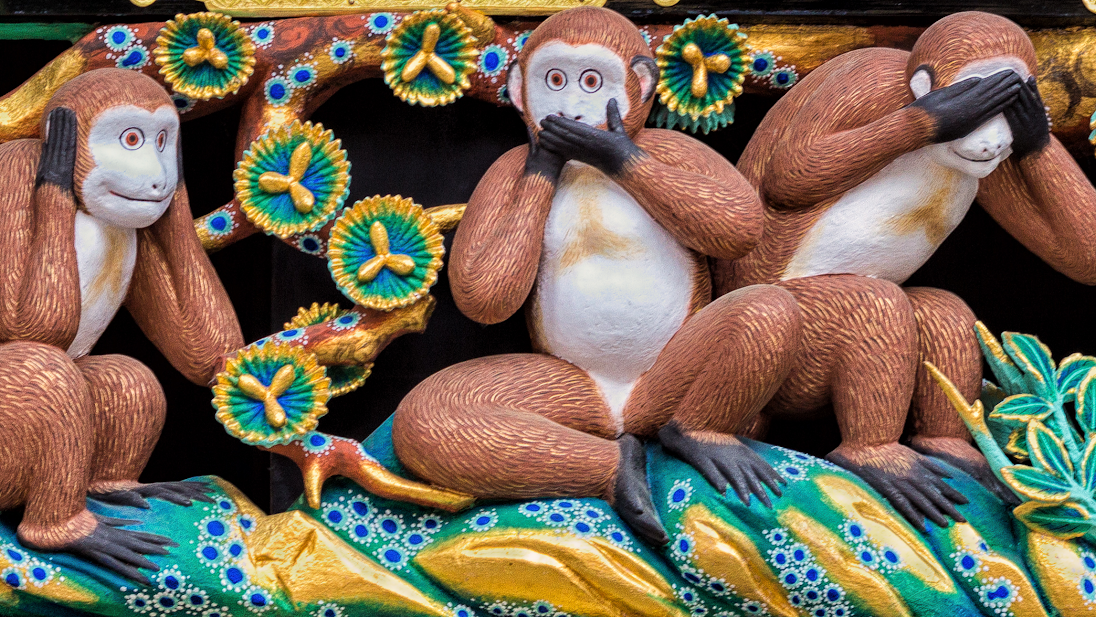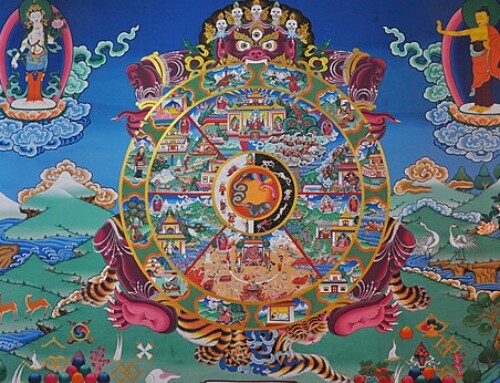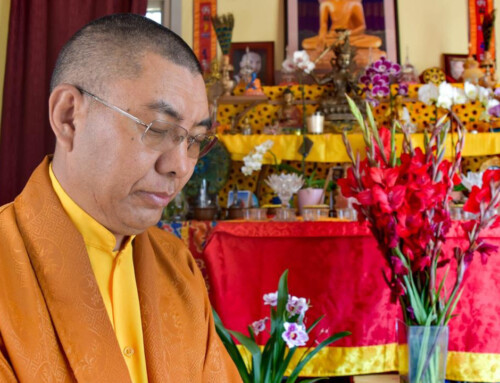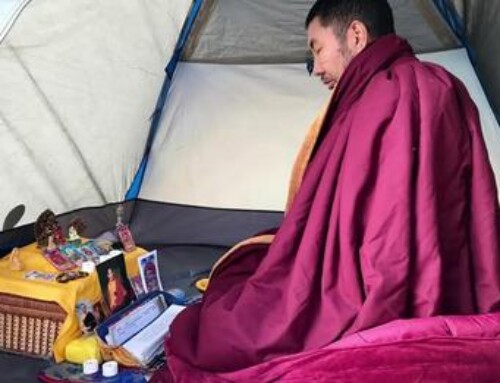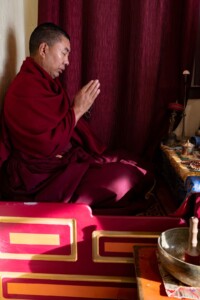 Body, speech, and mind are the fundamental aspects of sentient beings. Buddhists refer to these as the three doors or three gates. Whether one desires to open these doors towards virtuous or non virtuous deeds depends on the mind and how well the mind has been trained.
Body, speech, and mind are the fundamental aspects of sentient beings. Buddhists refer to these as the three doors or three gates. Whether one desires to open these doors towards virtuous or non virtuous deeds depends on the mind and how well the mind has been trained.
For example, when we say a person is good, what do we actually mean? Unless we are omniscient, we cannot know or see the state or quality of a person’s mind. However, we designate the good or bad aspects of this person based on their actions or words. We often infer a person is ‘bad’ when we see negative actions of the body such as killing or stealing, or negative actions of speech such as lying or divisiveness. Likewise, we tend to classify a person as ‘good’ when we see actions of compassion and love or speech of gentleness, kindness and truth.
Therefore, armed with these ordinary basic characteristics of the body, speech, and mind, it is difficult to benefit sentient beings and we cannot definitively say that we can be of benefit to others. First, we are ordinary beings steeped in ignorance. Secondly, during these degenerate times, even if the Buddha himself were to appear before you, you would not believe. Hence, in order to be of benefit, it is imperative that we keep constant awareness of our actions of body, speech, and mind. The pictorial maxim of the three wise monkeys, covering their eyes, ears, and mouth respectively, bears significant truth to how we must conduct our lives. The actions of the Buddhas and Bodhisattvas through their body, speech, and mind all result in the benefit of sentient beings one hundred percent of the time. Great Dharma Masters (Dampae kyibu lamas) and scholars (geshes) are able to benefit, though only up to a certain point. Actions of ordinary beings like us, while we may think we are doing something positive, instead of benefiting, sometimes on the contrary we cause harm. Thus, in certain circumstances, it is better not to say anything. There is a saying, “Do not look at everything you see. Do not listen to everything you hear. Do not utter everything that comes to mind.” This is the principle communicated by the three monkeys covering their eyes, ears, and mouth.
Before many years ago, during the age of the perfection years in the time of the Kadampa Masters when Buddhism was widely prevalent in Tibet and the Himalayan regions, there was a fundamental understanding that everything completely depended on the mind. Out of the three states of body, speech and mind, the mind was considered the most important and given the highest attention. Therefore, if you are able to train the mind efficiently, then everything stemming from that state of mind is beneficial. Hence every effort and resource was directed towards the achievement of this goal of training the mind with effort, perseverance, and meditation. Through such concerted efforts and gradual improvements, many were able to attain the ultimate path to liberation, as is stated in the Heart Sutra,“Tayatha-gate-gate-paragate-parasamgate-bodhiya-soha.”
Today in the 21st century, people are doing just the opposite: instead of pursuing the training of the mind, people tend to focus on the satisfaction of the five sense objects, which are sight, sound, smell, taste, and touch. Constant pursuit of the outer sensory objects leads to an unending pursuit for the satisfaction of the senses without the ability to see beyond the senses. During the age of perfection, the Tibetan Lamas pursued turning the mind inwards and achieving liberation. We can say there are two paths, the temporary path, which is the pursuit of worldly desires, and the ultimate path, which is the pursuit of liberation. Therefore, the pursuit limited solely to this lifetime is temporary and finite. All accumulation ends in exhaustion, all birth ends in death, all coming together ends in separation, and all that is constructed eventually gets dismantled. In the age-old Himalayan tradition, the pursuit of the cultivation of the mind, it has the capacity of endless development and improvement. It not only brings happiness during this lifetime, but results in ultimate happiness. Moreover, not only does it bring happiness to oneself, but has the capacity to bring happiness to others.
For example, Milarepa achieved liberation in one life. He was able to achieve this by wholeheartedly putting all his efforts towards the development and happiness of the mind. As the Tibetan saying goes, give less importance to food, clothes, and fame in order to achieve happiness. Milarepa spent years in isolated caves in meditation. During one of these episodes, when he was laying down beside a road, there happened to be three young teenage girls approaching his path. They were all very beautiful and well dressed. Milarepa, on the other hand, appeared dirty, almost naked, with not enough clothes on his body and a foul smell. The girls when approaching nearby covered their noses with their hands and made a derogatory remark, wishing to never be born in such a pitiable state as that of Milarepa. Milarepa slowly raised his head, looked at the girls, and is said to have composed a song. In the song, he stated that the girls were extremely fortunate to have come across Milarepa, who was a liberated being having accomplished the ultimate truth. Further, he said that the aspirations of the girls to never be born in such a state as Milarepa is not even in the likelihood of their karma. Therefore, they need not make such aspirations as they were not going to be reborn in such a state as to be accomplished like Milarepa. Milarepa said that in the future, very few individuals will achieve the state of accomplishment like him and though he has shown the path to liberation, only rare individuals will be able to attain such a state of accomplishment. From his perspective, he saw all sentient beings steeped in ignorance and madness. He said to them, “You three girls see me as a madman in a state of pity, but in actuality I am already a liberated being and you are ignorant.”
Personally, I feel that there are many things to be done with the body, speech, and mind. Through these three doors, we engage in virtuous and non virtuous actions. I feel that, like Milarepa, during our everyday life we need to put special emphasis on the mind and engage in mind training and use it to its fullest capacity, becoming familiar with it. The mind is the most intimate and closest thing that we have and we cannot be separated from it for even a moment. However, we ignore the mind and pursue after other sensory objects. Ignorantly, we place importance on temporary sensorial gratifications and direct our time, resources, energy, and attention to external objects, which ultimately become the enemy of the mind and bring unhappiness. Therefore, I feel not forgetting about the mind and its awareness every moment of our existence is important. Sometimes, while staying in solitude, my students express worry that I may be feeling lonely and unhappy. They offer their companionship to have breakfast or dinner with me. They feel that if you are without a companion during meals, you must be lonely. Sometimes, I jokingly tell them that today I am having a meal with my best friend – my mind. Therefore, the mind can be your most intimate and closest friend. If you are able to tread on the path of this pursuit of the mind, then you will reach a place where you have never gone before. All this is in my writing entitled, “A Dharma Gong to Wake Us from Ignorance”:
།རང་སེམས་ཡིད་བཞིན་ནོར་བུ་། །བདག་པོ་རྒྱག་མཁན་མི་འདུག།
།ཐམས་ཅད་དབང་ལྔའི་རྗེས་སུ། །གཅིག་རྗེས་གཉིས་མཐུད་འབྲངས་སོང་།
Nobody takes care
of the wish-fulfilling jewel of mind.
Everyone chases the five senses,
one after another.
།བསྲུང་རྒྱུ་ལུས་སེམས་གཉིས་ལས། །ཡོད་ཚད་ལུས་ལ་སྤྲད་ནས།
།སེམས་འདི་བདག་མེད་རེད་ཞག། །དེ་འདྲའི་སེམས་པ་སྐྱོ་བ།
Between body and mind
we give all care to our body
and leave no one in charge of our mind;
how sad is such an attitude!
 As for myself, I have gained a lot of experience of how people live their daily lives from having traveled around the world and being exposed to both Eastern and Western traditions. Before the Manjushri Dharma Center was established in California, I had the opportunity to live in the homes of many families and interact with them daily. They were all very kind to me. After a meal, they would often say, “Now that we have three hours of free time, what should we do? Either we go to the beach, or hike, or see a movie etc.” Their suggestions felt quite strange to me as my intention after lunch with some free time on hand was to use it to sit in contemplation about the mind. This occurrence was almost universal with every family. Having spent much of my time in Tibet and with a background and habituation in meditation and contemplation, I have come to consider the ultimate duty of an individual human being is to train the mind and be familiar with the mind. I feel people are constantly in the pursuit of doing something, whether it be physically doing something or verbally speaking, etc. Not much emphasis is placed on the workings of the mind. And, if they do consider the mind to be important, it is not on the top of their list of priorities. There is nothing that cannot be accomplished and what gets accomplished is based on what your priority is. I feel that the pursuit of physical and external objects have been accomplished by us through many of our lifetimes. In our past life, we most definitely must have done something similar to what we are doing now. As is said in the teaching, “A Dharma Gong to Wake Us from Ignorance”:
As for myself, I have gained a lot of experience of how people live their daily lives from having traveled around the world and being exposed to both Eastern and Western traditions. Before the Manjushri Dharma Center was established in California, I had the opportunity to live in the homes of many families and interact with them daily. They were all very kind to me. After a meal, they would often say, “Now that we have three hours of free time, what should we do? Either we go to the beach, or hike, or see a movie etc.” Their suggestions felt quite strange to me as my intention after lunch with some free time on hand was to use it to sit in contemplation about the mind. This occurrence was almost universal with every family. Having spent much of my time in Tibet and with a background and habituation in meditation and contemplation, I have come to consider the ultimate duty of an individual human being is to train the mind and be familiar with the mind. I feel people are constantly in the pursuit of doing something, whether it be physically doing something or verbally speaking, etc. Not much emphasis is placed on the workings of the mind. And, if they do consider the mind to be important, it is not on the top of their list of priorities. There is nothing that cannot be accomplished and what gets accomplished is based on what your priority is. I feel that the pursuit of physical and external objects have been accomplished by us through many of our lifetimes. In our past life, we most definitely must have done something similar to what we are doing now. As is said in the teaching, “A Dharma Gong to Wake Us from Ignorance”:
།ཕྱི་ཡི་དཔལ་འབྱོར་ཁང་ཁྱིམ། །སྲུང་ལ་ཉིན་མཚན་བྲེལ་ཅིང་།
།ནང་གི་སེམས་ཉིད་འདི་ལ། །བདག་པོ་རྒྱག་མཁན་མི་འདུག།
Taking care of external house and wealth,
Keeps us busy day and night,
Leaving no one to take care of
The inner essence of our mind.
།སྔ་མ་ཅི་བྱས་ད་ལྟའི། །ལུས་ལ་བལྟོས་དང་གསལ་ཞིང་།
།ཕྱི་མ་གར་འགྲོ་ད་ལྟའི། །ང་ཚོའི་ལག་པར་འདུག་གོ།
How did we act before?
Look at our present body and it is clear.
Where will we go next life?
That is in our hands right now.
We don’t have to ask for divinations and fortune telling. We can say with certainty that our past life has been occupied in the pursuit of physical senses with the result of being born as we are today. Therefore it is said to know your past, look at what you are today, and to know the future look at your actions of today. Since ultimate happiness comes from the mind, it is imperative for us to change our course of action and look inwards towards the mind. Our most trusted friend, Guru, and Deity is in the mind. Forsaking the treasure of the mind and replacing it with the counterfeit treasures of the outer world only brings disappointment and unhappiness. I feel if our pursuit is prioritized towards the contemplation of the mind, then we can tread on a path that will lead to the accomplishment of the ultimate truth. Our basic monkey mind is easily distracted and this distraction is exemplified and compounded with everything that surrounds us in these so called modern times with enticements of gadgets, advertisements, activities, etc. This creates an environment where an individual is unable to just sit and contemplate. Therefore, it is important to just sit and meditate on the mind with techniques such as meditation focusing on the breath. When someone says that they’re staying at home, it doesn’t refer to just sitting and doing nothing. The individual is engaged in doing something, keeping themselves busy by reading a book or watching a movie. Detaching from any form of physical and speech activity and the pursuit of just sitting with the mind is important.
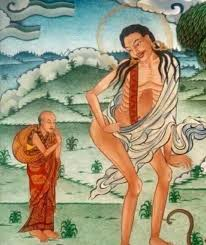 Just as in Milarepa and Gampopa’s story. After Milarepa had given teachings and instructions to his student Gampopa for twelve years, he said that he had a very special and exclusive teaching he wanted to give Gampopa. Gampopa was very curious as to what kind of teaching Milarepa was referring to as he had already received the entirety of Milarepa’s teachings. One day, Milarepa told Gampopa that he has been an excellent and well accomplished student, and that it was not necessary for him to stay with Milarepa any longer. It was time for him to leave for his village. Milarepa accompanied Gampopa to the edge of the river to bid him farewell. When Gampopa crossed over to the other side of the river, he suddenly remembered the special teaching Milarepa had promised him. So he shouted back to Milarepa and said he would return across the river in order to receive the special teaching that Milarepa had promised. Milarepa said he need not come back across the river. Milarepa would give him the special teaching from across the river. Then, Milarepa lifted up his lower garment and showed Gampopa his bottom that had become completely callused because of all the years of sitting in meditation and contemplation. This was a profound final teaching to Gampopa that emphasized sitting in meditation is much more important than Mahamudra (Chakgya chenpo) or the Six Yogas of Naropa ན་རོའི་ཆོས་དྲུག། (Naro cho druk).
Just as in Milarepa and Gampopa’s story. After Milarepa had given teachings and instructions to his student Gampopa for twelve years, he said that he had a very special and exclusive teaching he wanted to give Gampopa. Gampopa was very curious as to what kind of teaching Milarepa was referring to as he had already received the entirety of Milarepa’s teachings. One day, Milarepa told Gampopa that he has been an excellent and well accomplished student, and that it was not necessary for him to stay with Milarepa any longer. It was time for him to leave for his village. Milarepa accompanied Gampopa to the edge of the river to bid him farewell. When Gampopa crossed over to the other side of the river, he suddenly remembered the special teaching Milarepa had promised him. So he shouted back to Milarepa and said he would return across the river in order to receive the special teaching that Milarepa had promised. Milarepa said he need not come back across the river. Milarepa would give him the special teaching from across the river. Then, Milarepa lifted up his lower garment and showed Gampopa his bottom that had become completely callused because of all the years of sitting in meditation and contemplation. This was a profound final teaching to Gampopa that emphasized sitting in meditation is much more important than Mahamudra (Chakgya chenpo) or the Six Yogas of Naropa ན་རོའི་ཆོས་དྲུག། (Naro cho druk).
Thus, I feel in this modern era after retirement with daily living provided with pension or savings benefits, for some of us there is the opportunity and the time to sit in contemplation. However, many engage in even further pursuits and schedules that keep them busy. I feel that even though our younger years have been spent in mundane worldly pursuits, in retirement there is every opportunity and time to just sit as Milarepa had indicated in his final display to Gampopa. I wanted to express my views out of compassion for my students who have developed a karmic relationship with me as a Teacher. I hope this will be of benefit to you all. Tashi Delek
Originally posted to Khenpo Karten Rinpoche’s Blog on August 5th, 2024. This blog was dictated by Khenpo Karten Rinpoche, and transcribed and translated by Dechen Baltso, with a bit of assistance from Karma Choeying, through a series of conversations and audio recorded messages.

